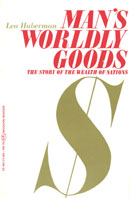
Man's Worldly Goods
The Story of the Wealth of Nations
Huberman, Leo
Publisher: Monthly Review Press, USA
Year First Published: 1936
Year Published: 1968
Pages: 348pp Price: $3.45 ISBN: 85345-070-6
Resource Type: Book
Cx Number: CX6701
Huberman sets out to explain history using economic theory, and to explain economic theory using history. He tries to explain, in terms of the development of economic thought, why certain doctrines arose when they did, how they originated in the very fabric of social life, and how they were developed, modified, and overthrown when the pattern of that fabric was changed.
Abstract:
-
Table of Contents
Part I From Feudalism to Capitalism
I. Prayers, Fighters-and Workers
II. Enter the Trader
III. Going to Town
IV. New Ideas for Old
V. The Peasant Bursts His Bonds
VI. "And No Stranger Shall Work in the Said Trade…"
VII. Here Comes the King!
VIII. "Rich Man…"
IX. …Poor Man, Beggar Man, Thief"
X. Help Wanted-Two-year-olds May Apply
XI. "Gold, Greatness, and Glory"
XII. Let Us Alone!
XIII. "The Old Order Changeth…"
Part II From Capitalism to?
XIV. Where Did the Money Come From?
XV. Revolution- in Industry, Agriculture, Transport
XVI. "The Seed Ye Sow, Another Reaps…"
XVII. Whose "Natural Laws"?
XVIII. "Workingmen of All Countries, Unite!"
XIX. " I Would Annex The Planets If I Could…"
XX. The Weakest Link
XXI. Russia Has A Plan
XXII. Will They Give up the Sugar?
Appendix, Including Page References to Sources of Quotations
Bibliography
Index
Subject Headings


